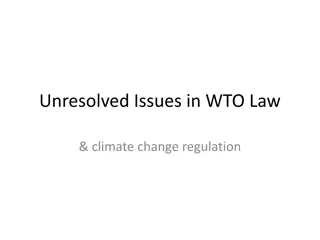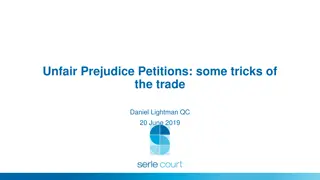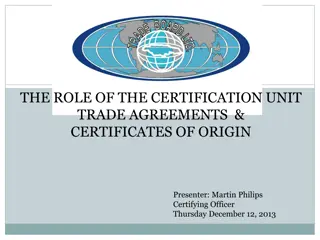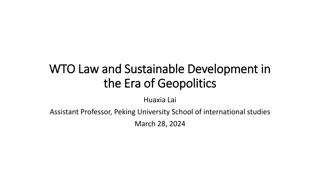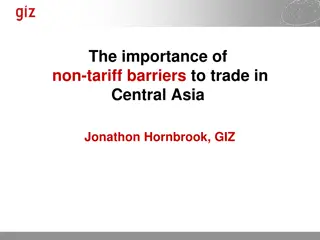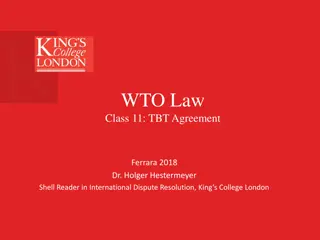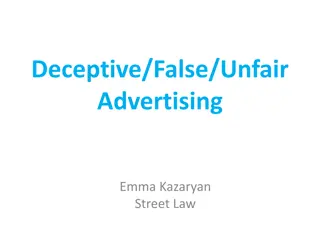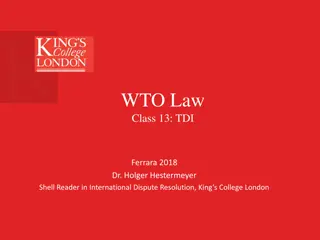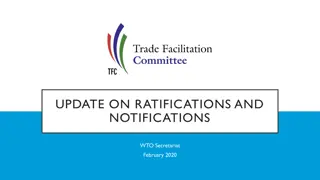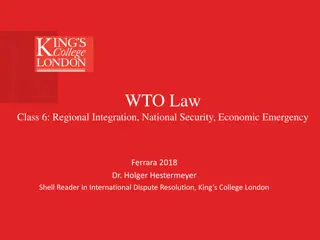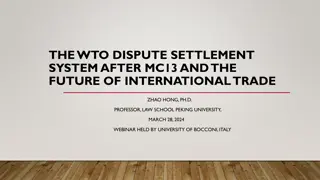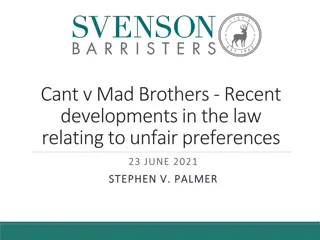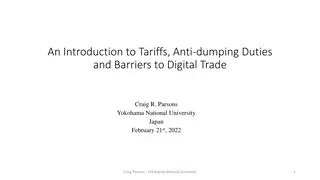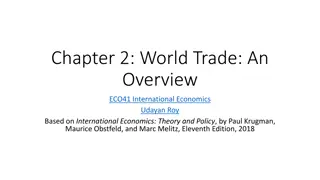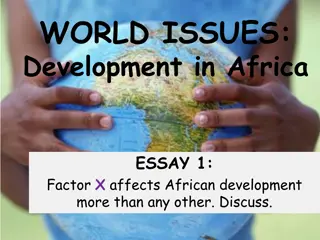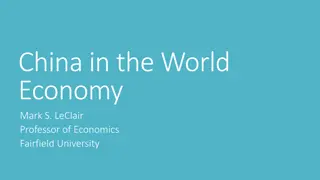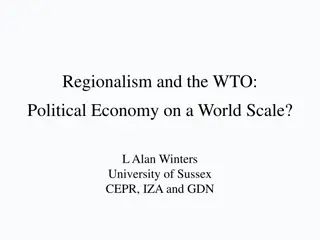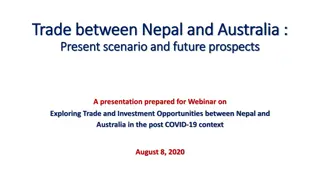Managing Unfair Trade Practices in Compliance with WTO
Unfair trade practices (UTP) encompass fraudulent, deceptive, or dishonest practices that are prohibited by law. The WTO provides remedies against UTP, allowing governments to address genuine harm to domestic industries. Kenya has taken steps to combat UTP by enacting the Trade Remedies Act and establishing the KeTRA agency to investigate and address such practices. The program aims to strengthen institutional capacity in combating UTP.
Uploaded on Sep 16, 2024 | 3 Views
Download Presentation

Please find below an Image/Link to download the presentation.
The content on the website is provided AS IS for your information and personal use only. It may not be sold, licensed, or shared on other websites without obtaining consent from the author. Download presentation by click this link. If you encounter any issues during the download, it is possible that the publisher has removed the file from their server.
E N D
Presentation Transcript
KNOWLEDGE SHARING ON TRADE AND INVESTMENT GOOD PRACTICES Managing unfair trade practices in compliance with WTO Managing unfair trade practices in compliance with WTO provisions and Regional Commitments provisions and Regional Commitments PRESENTER: Mr. Geoffrey Mwenda. PRESENTER: Mr. Geoffrey Mwenda.
What is unfair trade practices. UTP broadly refers to any fraudulent, deceptive or dishonest trade practice which is prohibited by a statute or has been recognized as actionable under law by a judgment of the court. These practices may be in form of: dumping, subsidization of imported products into a country, Import surges, Others like Counterfeits, Non Tarriff Barriers in regional markets, Influx of illicit goods and Transhipment of products through countries benefiting from preferential market access. I. II. III. IV.
WTO TRADE REMEDIES The WTO agreement allows governments to act against unfair trade practices where there is genuine ( material ) injury to the competing domestic industry. Binding tariffs and applying them equally to all trading partners are key to the smooth flow of trade in goods.
The WTO agreements exceptions: actions taken against dumping subsidies and special countervailing duties to offset the subsidies emergency measures to limit imports temporarily, designed to safeguard domestic industries.
Kenyas affected companies Eveready East Africa, Colgate Palmolive, Reckitt Benckiser, Cadbury Kenya, Bridgestone, Devki Steel, and Procter & Gamble. In order to remedy the problem, Trade Remedies Act was enacted in June 2017 to create a Trade Remedies Agency. (KeTRA) This will help Kenya to minimise the levels of unfair trade practices especially at this time where AfCFTA is operational.
Mandates of KeTRA Investigate and evaluate allegations of dumping and subsidization of imports; II. Investigate and evaluate requests for application of safeguard measures on any imported product; III. Initiate and conduct public awareness and the training of stakeholders on its functions and on trade remedies; IV. Publish and disseminate manuals, codes, guidelines, and decisions relating to its functions; V. Perform such other functions as the Cabinet Secretary may assign to it. I.
Tradecomii program OUTPUTS Through EU s support; TradeCom 11 Outputs were: To strengthen KETRA s institutional capacity for managing unfair trade practices To conduct situational analyses of the state of unfair trade practices facing the manufacturing sector in Kenya.
CASE STUDIES OF KENYAN PRODUCT S CASE STUDIES OF KENYAN PRODUCT S SUBJECT TO UNFAIR TRADE PRACTICES SUBJECT TO UNFAIR TRADE PRACTICES
CASE STUDIES OF KENYAN PRODUCTS CASE STUDIES OF KENYAN PRODUCTS continued continued Globally traded products which are subject to unfair trade practices, some of which Kenya imports include: Coffee Natural Gas Gold Wheat Cotton Sugar Silver Copper. Oil
COMPARISON OF PRODUCTION WITH DEMAND OF COMPARISON OF PRODUCTION WITH DEMAND OF SELECT PRODUCTS SELECT PRODUCTS KENYA PRODUCTION, DEMAND DATA FOR SELECT PRODUCTS, KENYA PRODUCTION, DEMAND DATA FOR SELECT PRODUCTS, 2017 (000 2017 (000 TONNES TONNES) ) P Produ roduc ct t P Produ roduc ctio tion n I Im mport ports s Ex Expo por rt ts s S Sto tocks cks D Dema eman nd d M Milk ilk 3,855 87 5 -815 4 4, ,75 752 2 S Su ugar gar 413 1,002 18 685 71 712 2 W Whe heat at R Ri ic ce e ( (mill milled M Mai aiz ze e Me Meat at C Ce em men 165 54 1,879 646 20 1 35 3 1 1, ,98 989 9 69 696 6 ed) ) 3,186 724 6 6, ,16 163 3 1,374 1 1 15 5 6 -654 -125 0 0 5 5, ,20 208 8 84 840 0 5 5, ,78 789 9 10 ent t 38 388 8
COMPARISON OF PRODUCTION WITH DEMAND COMPARISON OF PRODUCTION WITH DEMAND OF SELECT PRODUCTS continued OF SELECT PRODUCTS continued The effect of unfair trade practices can be established with level of stockpiles in the domestic industry. In 2017, there appears to be dumping of sugar while there was consistent run down of stocks in milk, maize and meat in the above table. There were no stockpiles in cement.
Comparison of Import and domestic prices for Comparison of Import and domestic prices for different products different products C Co om mm mo od di it ty y U Un nit it Ye Year ar I Im mp po or rt t p pr ri ic ce e 29,223 27,601 25,083 21,201 22,858 34,453 33,331 30,198 27,953 26,713 24,506 20,283 17,098 24,480 30,321 60,925 51,590 55,294 48,143 44,313 60,642 52,478 D Do om me es st tic p pr ri ic ce e 37,449 34,953 35,616 37,184 31,980 35,335 34,833 47,290 45,227 42,841 31,332 33,185 28,701 29,688 39,873 63,660 62,946 59,208 54,317 54,892 81,547 67,626 ic I Im mp po or rt t/ /d do om m e es st tic ic p pr ri ic ce e 0.78 0.78 0.79 0.79 0.70 0.70 0.66 0.66 0.71 0.71 0.97 0.97 0.96 0.96 0.64 0.64 0.62 0.62 0.62 0.62 0.78 0.78 0.62 0.62 0.60 0.60 0.82 0.82 0.76 0.76 0.96 0.96 0.82 0.82 0.93 0.93 0.87 0.87 0.81 0.81 0.74 0.74 0.78 0.78 Tonne 2013 2014 2015 2016 2017 2013 2014 2015 2016 2017 2013 2014 2015 2016 2017 2013 2014 2015 2016 2017 2013 2014 W Wh he eat at un unm mil ile ed d * * * * R Ri ic ce e Tonne * * * * M Mai aiz ze e un unm mill ille ed d Tonne * * * * * * * * * W Wh he eat at f flo lou ur r Tonne *
Continued.. All import prices are below domestic prices, an indication of either competitiveness or potential benefit of some elements of unfair trade practices in the exporting markets. For example: Wheat import prices on average are below domestic prices by about 20-30%; ii. The price differentials in favor of import is in the order of 5-40% of domestic prices of rice; i.
Output 1: To strengthen KETRAs institutional capacity for managing unfair trade practices WTO sectors identified to be affected by unfair trade practices are products ie Oil, Coffee, Natural Gas, Gold, Wheat, Cotton, Sugar, Silver Copper. Identification of global products benefitting from unfair trade practices Implication of imports on domestic production Different analysis to establish sectors/products that may be subject to unfair trade practices.
Output 2: To conduct situational analyses of the state of unfair trade practices facing the manufacturing sector in Kenya Formulation of tool for field study Identification of Public sector policy and coordinating agencies Identification of a sample of 30 firms to participate in the pilot study Sensitisation sessions held and Sensitisation materials including PPTs and reference reports printed. training session and validation of findings from study A strategy for operationalisation of KETRA Law was done
Recommendations for possible additional support interventions Capacity building the KeTRA Staff through trainings. Undertaking public sector sensitizations across the country and Regionally. Foreign benchmarking and exchange missions for KeTRA staff in countries with established Trade Remedies Agencies. Infrastructural support such as Trade Analysis SYSTEMS and Office Equipment



